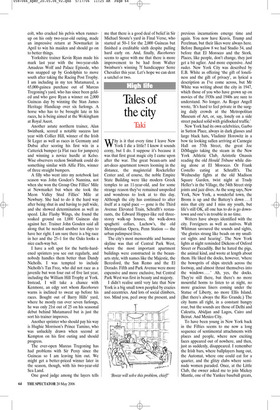Tales of the city
Taki
Why is it that every time I leave New York I die a little? I know it sounds corny, but I do. I suppose it’s because it was that first great magic city I came upon after the war. The great beaux-arts and art-deco apartment towers looming in the distance, the magisterial Rockefeller Center and, of course, the noble Empire State Building were like modern Greek temples to an 11-year-old, and for some strange reason they’ve remained unspoiled and wondrous to look at to this day. Although the city has continued to alter itself at a rapid pace — gone is the Third Avenue Elevated Train, Schrafft’s restaurants, the Edward Hopper-like red threestorey walk-up houses, the walk-down spaghetti cellars, Luchow’s, the old Metropolitan Opera, Penn Station — the urban palimpsest lives.
The city’s most memorable and humane skyline was that of Central Park West, where the most important apartment buildings were constructed in the beauxarts style, with names like the Majestic, the Beresford, the San Remo and the El Dorado. Fifth and Park Avenue were more expensive and more exclusive, but Central Park West was first in beauty and majesty.
I didn’t realise until very late that New York is a big small town peopled by crazies and eccentrics. And lots of social climbers, too. Mind you, peel away the present, and previous incarnations emerge time and again. You now have Kravis, Trump and Perelman, but their likes were always here. Before Bungalow 8 we had Studio 54, and before that El Morocco and the Stork. Places, like people, don’t change, they just get a bit uglier. And more expensive. And ruder. New York City was described by E.B. White as offering ‘the gift of loneliness and the gift of privacy’, as lyrical a description as I’ve come across, but Mr White was writing about the city in 1947, which those of you who have grown up on movies of the 1930s and 1940s are sure to understand. No longer. As Roger Angell wrote, ‘It’s hard to feel private in the surging daily crowds at the Metropolitan Museum of Art, or, say, lonely on a side street packed solid with gridlocked traffic.’ New York had its own celebrities, Garbo in Sutton Place, always in dark glasses and large black hats, Vladimir Horowitz in a bow tie looking sullen arriving at Carnegie Hall on 57th Street, the great Joe DiMaggio taking the steam in the New York Athletic Club, Aristotle Onassis reading the old Herald Tribune while dining alone at El Morocco. Or Frank Costello eating at Schrafft’s. The Wednesday fights at the old Madison Square Garden, twist night at Trudy Heller’s in the Village, the 54th Street strip joints and jazz dives. As the song says, New York, New York, a wonderful town, the Bronx is up and the Battery’s down ... I miss that city and I miss my youth, but life’s still OK, all one has to do is go downtown and one’s in trouble in no time.
Writers have always identified with the city. Foreigners as well as natives. Walt Whitman savoured the sounds and sights, ‘the glories strung like beads on my smallest sights and hearing’. The New York lights at night reminded Dickens of Oxford Street or Piccadilly. But he hated the pigs, the animal kind, and wrote at length about them. He liked the docks, however, ‘where the bowsprits of ships stretch across the footway, and almost thrust themselves into the windows ... ’ Ah, yes, the docks. They’re still there, but there’s no more mournful horns to listen to at night, no more gracious liners coming under the Statue of Liberty, no more Ellis Island. (But there’s always the Rio Grande.) The city hums all right, in a constant hungry roar, but the sounds are those of Delhi and Calcutta, Abidjan and Lagos, Cairo and Beirut. And Mexico City.
To have been young in New York back in the Fifties seems to me now a long sequence of sentimental attachments with places and people, where new exciting faces appeared out of nowhere, and then, just as suddenly, disappeared. I remember the Irish bars, where ballplayers hung out, the Automat, where one could eat for a quarter, and the glitzy clubs where seminude women paraded. Once, at the Little Club, the owner asked me to join Mickey Mantle, one of the Yankee baseball greats, for a drink. I was with a beautiful actress, hence the invite. What I remember best was the Mick’s (as he was known) inability to speak to her. He didn’t want to hurt a younger man’s feelings. Those were the days, but enough of nostalgia. I’m sad but I’m off to the south of France on my boat. And I’ve just died a little.



















































































 Previous page
Previous page